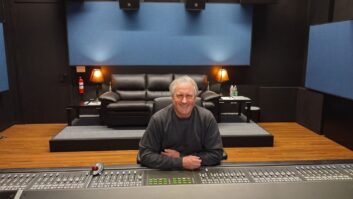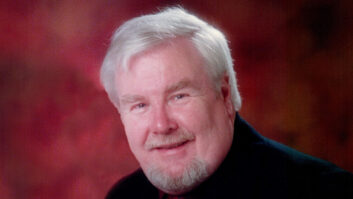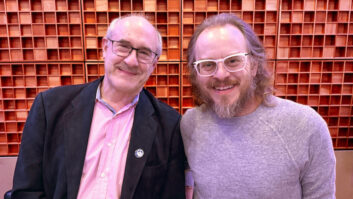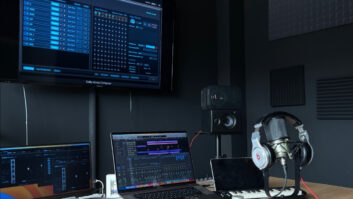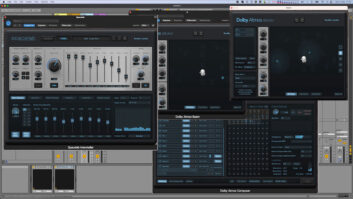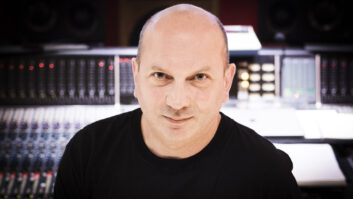Paul Robb, between laughs, explains why he’s concerned about winning two Clio awards for his work on a BMW television campaign. “Again, here I am suffering from the same thing that happened with Information Society. The first thing I ever tried was a booming home run, and I am going to be living up to that probably for the next ten years,” he says alluding to his success with the pop-techno outfit he fronted in the late ’80s; their song “What’s On Your Mind (Pure Energy),” became a Number 3 hit. “Everyone will be saying, ‘Yeah that spot was okay, but it wasn’t as good as those BMW spots in 1998.’ When you win two Clios for the first commercial you have ever done, it tends to build up some expectations.”
Rather than becoming a slave to those expectations, Robb has turned to a number of different composing possibilities. Whether it’s his two band projects, Brother Sun Sister Moon and Think Tank, or the scoring work he completed on the October Films release Orgazmo, Robb is busy. Of course, these opportunities did not come in overnight. After Information Society disbanded, Robb found work with MTV, re-scoring for the network’s international syndication market. At the time, MTV only had a blanket license to use music within the United States, so any type of programming that was going overseas, like Real World, MTV Sports or Road Rules had to be re-scored. It was a tremendous learning opportunity.
“I liked it in the sense that it forced me to create music in a style that I would not otherwise have been able to do, or not have wanted to do,” he explains. “So it extended my horizons in that sense. It also allowed me to accumulate a gigantic library of cues, which I have gone back to reference. It was kind of like scoring kindergarten actually, because I got to see what the music editor or director had put under various scenes, and then I got to do my own take on it. It’s pretty fun, too, because the longest cue was about 60 seconds, so I never had to get all finicky and bent out of shape about any particular piece of music-as opposed to the ‘music world,’ where one song can take you a year to deal with.
“It also taught me how to put music to picture, which I had never done up to that point,” he continues. “Not just the mechanics of it, but the, if I dare say, the art of it. Not that MTV Sports is exactly the most subtle use of music in the world, but for my style I think it kind of worked out pretty well.”
To work up his scoring assignments Robb has assembled a home studio-he calls it the Wreck Room-that blends the old school MIDI gear he started with back in 1987 and some more up-to-date recording devices. For example, in the midst of a Mackie 32*8 board and two 24*E expanders is a 286 PC that runs his vintage main sequencing program. “I have been in the process of learning a new sequencer because I have been using the same sequencer since 1987 and people are starting to laugh at me,” he explains, “even though I get all defensive about it and I point out to them that I can do almost anything they can do and usually in about one-tenth the time.”
One thing conspicuously absent from Robb’s studio is a hard disk recording system. Sure he has the standard arsenal of rackmount modules, including Yamaha SPX90, Lexicon LXP-1 and just about the entire E-mu Proteus family, but he’s got the hardware and not their plug-in counterparts. “A lot of people who do what I do don’t do it that way,” he explains. “I think it’s kind of a function of the fact that I started in this game rather early. As a matter of fact, I’m pre-MIDI. I bought my first synthesizer in 1980. I remember when MIDI first came out. I kind of just ignored it. I didn’t understand what it would do, and one of my friends who was more technically adept than me said, ‘Well, for one thing it will let you play two sounds from two different keyboards at the same time.’ I said, ‘Well why would anybody want to do that?’ So obviously I learned the error of my ways pretty fast.”
Included in his studio are synthesizers such as the Roland MKS-70, two MKS-50s, a MKS-80 and D-50; Yamaha TX-81Z; four Oberheim Matrix 1000s, E-mu Orbit and Morpheus, and a Casio VZ-10M. Sample players include Kurzweil 1000AX+, Roland U-110, Oberheim DPX-1, E-mu Proformance Piano and Proteus (as well as the Proteus 2 and 3), Alesis NanoBass and samplers, including a Casio FZ-10M, two Akai S-1000s and three Akai CD-3000s. He also turns to E-mu Procussion, Roland R-8M, Alesis DM-5, Roland BD-1 and a Roland SPD-11 for drum sounds.
His old-school sequencer is Voyetra, a DOS-based system, although he’s recently purchased and is trying to learn how to use Logic Audio. “You know, people are trying to change velocity or things like that with these giant tinker-toy kind of graphical interfaces, using a mouse to bring a ball into a hole or something like that. In the meantime, I have just changed a number from 127 to 80 and it’s done.”
Because film work brings such a high profile, Robb’s biggest gig to date has been Orgazmo, a spoof of the porno industry and superhero action mindset by South Park creators Matt Stone and Trey Parker. He says he lucked into it. “Of all the strange accidents that have happened in my career that have led me down various odd paths of the industry, the Orgazmo story has to be the oddest of all,” he explains. He got a call from the old Information Society drummer who had a friend who had lunch with a friend who had just gotten a deal with Fox television to develop a pilot. When the friend mentioned he knew the old drummer of Information Society, the budding Hollywood star flipped, and the phone rang at the Robb residence. “My friend Ed called me and said, ‘You know a friend of a friend of a friend wants you to do music for a pilot for Fox,'” Robb says. “I was just sitting there thinking, ‘Yes, yes, yeah, I’m sure. How many times does this kind of thing happen? Trent Reznor wants me to do a remix; I heard it on the Net.'”
The first round of pilots was bumped by Fox, but sometime during the winter of 1995 they sent him another pilot they had done. It was a little animated short titled “The Spirit of Christmas,” which became one of the biggest sensations in Hollywood that year. The success of that short, of course, and the following series enabled Parker and Stone to line up financing for Orgazmo, and they wanted Robb to do the score. “It turns out when Trey Parker wrote the script, he was writing in the music cues as he went, and all his music cues said something like, ‘This place would be good for a song by Information Society,’ or ‘put Information Society here.'”
So spotting the film was a relatively easy process. But when Robb got back to his studio (which was then in Minneapolis), it was an entirely different matter. “I was completely flying by the seat of my pants,” he remembers. “At that point, I had never scored a feature film, and most of the other people they were hiring were actual film industry people. Those people don’t want to take the time to tell you how to score a film if you have just been hired to score a film. So I was in a situation where I would not dare ask anybody or say, ‘Excuse me, by the way, I don’t have any idea what I am doing.'”
He worked it out the old-fashioned way of just doing it until he was told it was wrong and then changing everything. In hindsight, he thinks that getting the equipment together was much easier than figuring out how to write the cues. “It was challenging because there wasn’t all that much room for my own personal style of music, and a good percentage of the cues were tongue-in-cheek. In other words, the music was supposed to conform to an action music cliche or a porno music cliche, so that was very challenging for me to come up with something that was good but kind of bad,” he explains. “The yardstick of whether it worked or not was: Is it kind of embarrassing? It was a difficult line to negotiate between, ‘Okay, this one is supposed to be kind of cheesy, but this one is real.’ That was a little training course in the psychology of movie-making.”
Now that he has the experience of pop music stardom, advertising spot success and feature film exposure, Robb has had a chance to see where he feels most comfortable. Ultimately, he explains, he’d like to be known as a songwriter. “When I do soundtracks, a lot of times they are undeveloped parts of songs,” he says. “I’m never going to be your Danny Elfman or your John Williams that can sort of knock off symphonies or faux-symphonies. To tell you the truth, I’m not so sure that style has that long to live anyway. I’d like to bring a kind of electronic mindset and more post-modern mindset to film scoring, one that doesn’t rely on pseudo-romantic orchestra music.”

